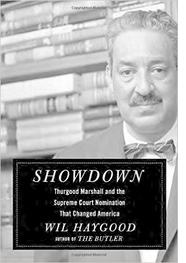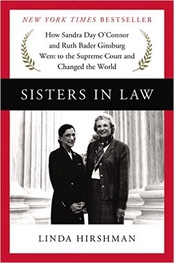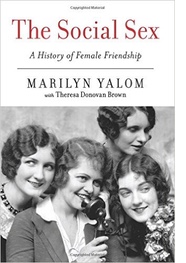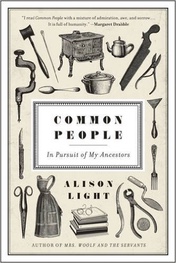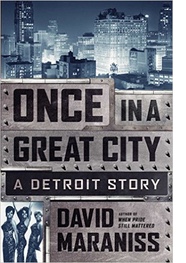NYT History Book Reviews: Who Got Noticed this Week?
Book: Showdown: Thurgood Marshall and the Supreme Court Nomination That Changed America by Wil Haygood
Publisher's
Summary (Via Amazon):
"Thurgood Marshall brought down the separate-but-equal doctrine,
integrated schools, and not only fought for human rights and human
dignity but also made them impossible to deny in the courts and in
the streets. In this stunning new biography, award-winning author Wil
Haygood surpasses the emotional impact of his inspiring best seller
The
Butler
to detail the life and career of one of the most transformative legal
minds of the past one hundred years.
"Using the framework
of the dramatic, contentious five-day Senate hearing to confirm
Marshall as the first African-American Supreme Court justice, Haygood
creates a provocative and moving look at Marshall’s life as well as
the politicians, lawyers, activists, and others who shaped—or
desperately tried to stop—the civil rights movement of the
twentieth century: President Lyndon Johnson; Congressman Adam Clayton
Powell Jr., whose scandals almost cost Marshall the Supreme Court
judgeship; Harry and Harriette Moore, the Florida NAACP workers
killed by the KKK; Justice J. Waties Waring, a racist lawyer from
South Carolina, who, after being appointed to the federal court,
became such a champion of civil rights that he was forced to flee the
South; John, Robert, and Ted Kennedy; Senator Strom Thurmond, the
renowned racist from South Carolina, who had a secret black mistress
and child; North Carolina senator Sam Ervin, who tried to use his
Constitutional expertise to block Marshall’s appointment; Senator
James Eastland of Mississippi, the head of the Senate Judiciary
Committee, who stated that segregation was “the law of nature, the
law of God”; Arkansas senator John McClellan, who, as a boy, after
Teddy Roosevelt invited Booker T. Washington to dinner at the White
House, wrote a prize-winning school essay proclaiming that Roosevelt
had destroyed the integrity of the presidency; and so many others."
Author: Wil Haygood is a Washington Post writer who is currently teaching at the University of Miami.
Reviewer: David Margolick, a contributing editor at Vanity Fair. In an interview with Biographile.com, David was asked: What classics would you read if you had all the time in the world? He replied, "I'd finally get past page 341 of Proust, page 228 of Middlemarch, page 49 of War and Peace and page 25 of Absalom, Absalom!"
Reviewer Highlights
"Haygood, the author of previous biographies of Adam Clayton Powell Jr., Sammy Davis Jr. and Sugar Ray Robinson, is passionate and, at times, eloquent. But 'Showdown' can be very rough going. There are spasms of bad writing, filled with tortured metaphors and redundancies: A 'risky tightrope' and 'Jewish synagogues' are but two. 'The entire American federal judiciary was nearly all white,' he writes. Characters are continually reintroduced, characterizations and facts needlessly repeated. Grousing about such potholes can seem petty. But they’re distracting, and besides, a figure and a story this grand deserve better.
"There are many mistakes. The Federal troops Dwight Eisenhower sent to Little Rock did not, as Haygood tells us, remain there 'for an entire year.' Franklin Roosevelt wasn’t president — or Eleanor first lady — when World War II ended. Sometimes he seems tone-deaf.
"Haygood has done a great service by reminding us of an extraordinary man at an extraordinary moment. He correctly notes that someone even remotely like Marshall, with his liberal record and instincts, would never be confirmed today. But for the real inside story of how all this happened, we’ll just have to wait — for Robert Caro."
Comments: Robert Caro is preoccupied with finishing up the fifth and final volume of The Years of Lyndon Johnson, but I will send him an e-mail to pick up the slack, with a postcard of Thurgood Marshall for sure-good measure.
Book: Sisters in Law: How Sandra Day O’Connor and Ruth Bader Ginsburg Went to the Supreme Court and Changed the World by Linda Hirshman
Publisher's Summary (Via Amazon): "The relationship between Sandra Day O’Connor and Ruth Bader Ginsburg—Republican and Democrat, Christian and Jew, western rancher’s daughter and Brooklyn girl—transcends party, religion, region, and culture. Strengthened by each other’s presence, these groundbreaking judges, the first and second to serve on the highest court in the land, have transformed the Constitution and America itself, making it a more equal place for all women.
"Linda Hirshman’s dual biography includes revealing stories of how these trailblazers fought for their own recognition in a male-dominated profession—battles that would ultimately benefit every American woman. She also makes clear how these two justices have shaped the legal framework of modern feminism, including employment discrimination, abortion, affirmative action, sexual harassment, and many other issues crucial to women’s lives."
Author: Linda Hirshman
Reviewer: Linda Greenhouse, the NYT's former Supreme Court reporter, teaches at Yale Law School. Her new book (with Michael J. Graetz), “The Burger Court and the Rise of the Judicial Right,” will be published next June.
Reviewer Highlights
"There is a fascinating book struggling to emerge from the narrative structure Linda Hirshman has imposed on rich material. We glimpse it on those occasions when Hirshman chooses to highlight not the similarities between the two women but their differences.
"Hirshman, a lawyer and a scholar of feminism, whose last book was the well-received 'Victory: The Triumphant Gay Revolution,' writes with authority and obvious admiration about Ginsburg (although with an odd fixation on the justice’s physical stature, describing her variously as 'tiny,' 'minuscule,' 'skinny,' 'petite,' 'small' and, twice, 'diminutive').
"But Hirshman struggles noticeably with what to make of O’Connor ('large, blond,' 'open-faced, cheerful and energetic'), and with how to fit her into the book’s overall construct.
"The book’s title is offered without irony, but while Hirshman is too astute an observer to believe it fully, she is stuck with it nonetheless. This would have been a more coherent and satisfying book had she been willing to portray her subjects as I think she actually does understand them: not as sisters yoked together in a common project, but rather as representatives of the different ways that smart, ambitious women navigated life in mid-20th- century America, when social norms and expectations were changing but old patterns still prevailed."
Comments: An article from 2005 on HNN: Why Ronald Reagan Picked Sandra Day O'Connor--And Why George W. Bush Might Want to Follow His Example
Book: The Social Sex: A History of Female Friendship by Marilyn Yalom with Theresa Donovan Brown
Publisher's Summary (Via Amazon): "In today’s culture, the bonds of female friendship are taken as a given. But only a few centuries ago, the idea of female friendship was completely unacknowledged, even pooh-poohed. Only men, the reasoning went, had the emotional and intellectual depth to develop and sustain these meaningful relationships.
"Surveying history, literature, philosophy, religion, and pop culture, acclaimed author and historian Marilyn Yalom and co-author Theresa Donovan Brown demonstrate how women were able to co-opt the public face of friendship throughout the years. Chronicling shifting attitudes toward friendship—both female and male—from the Bible and the Romans to the Enlightenment to the women’s rights movements of the ‘60s up to Sex and the City and Bridesmaids, they reveal how the concept of female friendship has been inextricably linked to the larger social and cultural movements that have defined human history."
Authors: Marilyn Yalom, a senior scholar at the Clayman Institute for Gender Research at Stanford University, and Theresa Donovan Brown, a writer with a background in finance.
Reviewer: Ann Friedman, who writes a column about politics, culture and gender for New York magazine’s website.
Reviewer Highlights
“ 'Almost all the documents on friendship during the first 2,000 years of Western history . . . pertain to men,' Yalom and Donovan Brown acknowledge, which makes the beginning chapters of their book a bit thin on the sorts of stories that tend to define and differentiate friendships. This is understandable, given the paltry documentation of women’s private lives. But it still, at times, makes for rather plodding reading. 'The Social Sex' can feel like a textbook."
Comments: Gossip is good for women's health, scientists claim.
Book: Common People: In Pursuit of My Ancestors by Alison Light
Publisher's
Summary (Via Amazon):
“ 'Family history begins with missing persons,' Alison Light writes
in Common
People.
We wonder about those we’ve lost, and those we never knew, about
the long skein that led to us, and to here, and to now. So we start
exploring.
"Most of us, however, give up a few
generations back. We run into a gap, get embarrassed by a
ne’er-do-well, or simply find our ancestors are less glamorous than
we’d hoped. That didn’t stop Alison Light: in the last weeks of
her father’s life, she embarked on an attempt to trace the history
of her family as far back as she could reasonably go. The result is a
clear-eyed, fascinating, frequently moving account of the lives of
everyday people, of the tough decisions and hard work, the good luck
and bad breaks, that chart the course of a life. Light’s
forebears—servants, sailors, farm workers—were among the poorest,
traveling the country looking for work; they left few lasting marks
on the world. But through her painstaking work in archives, and her
ability to make the people and struggles of the past come alive,
Light reminds us that 'every life, even glimpsed through the chinks
of the census, has its surprises and secrets.' ”
"What
she did for the servants of Bloomsbury in her celebrated Mrs.
Woolf and the Servants
Light does here for her own ancestors, and, by extension, everyone’s:
draws their experiences from the shadows of the past and helps us
understand their lives, estranged from us by time yet inextricably
interwoven with our own. Family history, in her hands, becomes a new
kind of public history."
Author: Alison Light. As the widow of the historian, Raphael Samuel, she spent several years helping to establish a History Centre and Archive in his name: both are now flourishing in London.
Reviewer: Penelope Lively. " 'She is interested in the operation of memory - how it works and how we use it - and with the nature of evidence,' wrote her editor at Penguin, Juliet Annan. 'Her preoccupations are with telling a tale from different angles... But also, like any good historian, she is meticulous in her research.' Penelope is also widowed and resides in London.
Reviewer Highlights
"For 'Common People' is a great deal more than a family history. Light is a literary historian, and her talent here has been to use her skills not just to pursue individuals through the thickets of record offices and county archives (and today, of course, the Internet) but to set them within their historical era.
"The achievement of 'Common People' is its triumphant demonstration of the interplay between individual lives and the somber backcloth of economic circumstance. People and what they do — what they have had to do — illuminate the gray narrative of history.
"Read 'Common People' and you will emerge knowing something about needle-making in the 19th century, about bricklaying, about the history and significance of the Baptist movement, about the cod fishing industry, the Victorian workhouse, Portsmouth’s naval dockyards, the press gangs, cholera. . . . You will discover something of the variety and intricacy of laboring life in the past, of the laws of supply and demand that determined how people had to live and work."
"There’s an undeniable blizzard of names in this book, too many to keep tabs on — but that doesn’t matter. The effect of 'Common People' is to make you aware of the hidden network of anyone’s ancestry. In illuminating her own, Light serves up the most powerful family history I have ever read."
Comments: It does make one wonder how connected we are to the past - to the constellations of our ancestors whose roots give us our definition. If only I had a couple of snake oil salesmen in my family line, then maybe I'd have a shot at being a future Rockefeller.
Book: Once in a Great City: A Detroit Story by David Maraniss
Publisher's
Summary (Via Amazon):
"It’s
1963 and Detroit is on top of the world. The city’s leaders are
among the most visionary in America: Grandson of the first Ford;
Henry Ford II; influential labor leader Walter Reuther; Motown’s
founder Berry Gordy; the Reverend C.L. Franklin and his daughter, the
amazing Aretha; Governor George Romney, Mormon and Civil Rights
advocate; super car salesman Lee Iacocca; Mayor Jerome Cavanagh, a
Kennedy acolyte; Police Commissioner George Edwards; Martin Luther
King. It was the American auto makers’ best year; the revolution in
music and politics was underway. Reuther’s UAW had helped lift the
middle class.
"The time was full of promise. The auto
industry was selling more cars than ever before and inventing the
Mustang. Motown was capturing the world with its amazing artists. The
progressive labor movement was rooted in Detroit with the UAW. Martin
Luther King delivered his 'I Have a Dream' speech there two
months before he made it famous in the Washington march.
"Once
in a Great City shows that the shadows of collapse were evident even
then. Before the devastating riot. Before the decades of civic
corruption and neglect, and white flight. Before people trotted out
the grab bag of rust belt infirmities—from harsh weather to high
labor costs—and competition from abroad to explain Detroit’s
collapse, one could see the signs of a city’s ruin. Detroit at its
peak was threatened by its own design. It was being abandoned by the
new world. Yet so much of what Detroit gave America lasts."
Author: David Maraniss
Reviewer: Michiko Kakutani
Reviewer Highlights
"In his elegiac and richly detailed new book, 'Once in a Great City,' David Maraniss — the author of biographies of Barack Obama, Bill Clinton and Roberto Clemente — conjures those boom years of his former hometown with novelistic ardor. Using overlapping portraits of Detroiters (from politicians to musicians to auto execs), he creates a mosaiclike picture of the city that has the sort of intimacy and tactile emotion that Larry McMurtry brought to his depictions of the Old West, and the gritty sweep of David Simon’s HBO series 'The Wire.'
"The book would have benefited from a little more context, like the causes and consequences of its devastating 1967 riot and an analysis of the role that the city’s reliance on a single industry would play in hastening its fall. And Mr. Maraniss retraces considerable ground that will be familiar to readers of books like Paul Ingrassia’s 'Crash Course: The American Automobile Industry’s Road from Glory to Disaster' and Nelson George’s 'Where Did Our Love Go?: The Rise and Fall of the Motown Sound.'
"But Mr. Maraniss does not aim to break a lot of new ground here or to delve too deeply into any one aspect of early-‘60s Detroit; his goal is something more impressionistic and zeitgeist-y. And at this, he succeeds with authoritative, adrenaline-laced flair."
Comments: Cities brought back from the brink show there is hope for bankrupt Detroit.
For Fun: Things Historians Can’t Live Without
